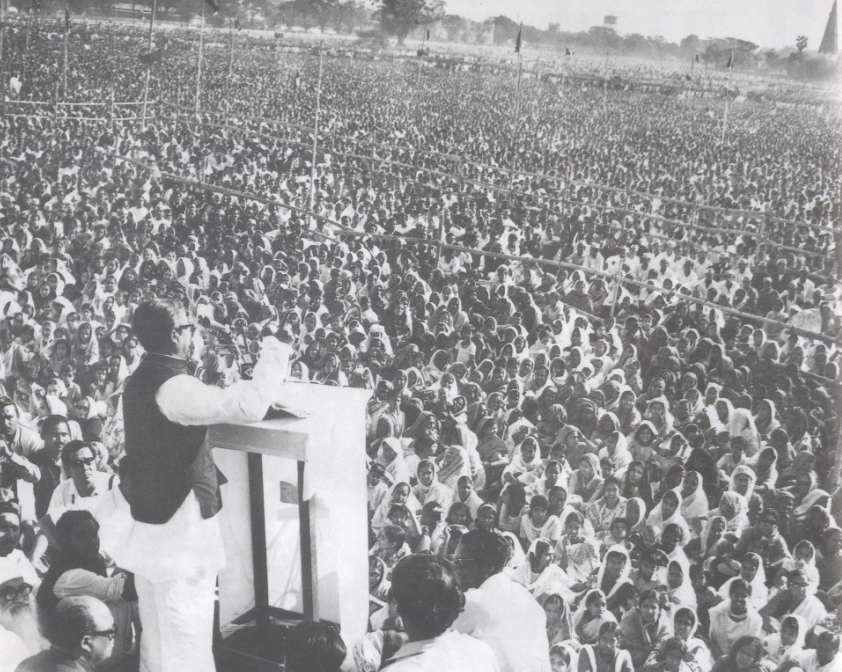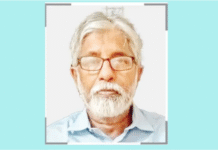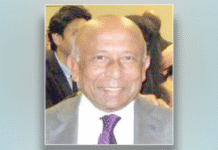The controversy around Air Vice Marshal A K Khandaker’s book is largely limited to what is said on page 32. Let us sum it up — “Bangabandhu’s speech was significant but it didn’t provide any directions to achieve Independence. It would have been silly to call for independence when the AL was not prepared. Most probably this was the reason why he didn’t call for independence. Besides, he was requested by Yahya Khan not to give such a speech. Maybe he saw a ray of hope in the presence of Yahya Khan in Dhaka.”
“I don’t think that the Liberation War was triggered by this speech by Bangabandhu. The last words of this speech were, ‘Joy Bangla! Joy Pakistan!’ Whether it’s a call for independence or liberation war is a much debated question. Had the AL leaders been prepared, then civil and military mobilisation could have begun properly by early March. If that had happened, the war could have been finished in a short time and our victory ensured. But sadly, this didn’t happen.”
* * *
This is not aimed at questioning the patriotism of Sheikh Mujib but at the capacity of the AL party to deliver independence. He is basically saying that as a party it failed and the nine-month war could have been over much before and with a lot less suffering, though this is debatable. But it’s this statement that challenges the AL and questions their ability to rule. No wonder the AL is so furious with him because he accuses them of incompetence at a national level in history. He is seen as a traitor because he was part of the team, generally considered an AL loyalist and hence the reaction. But what did Sheikh Mujib say?
* * *
After so many years, the matter has become hazy for most and that is inevitable when one builds national history through hearsay and conjecture rather than documentation. Nobody seems to know what actually was said and people claiming to be present are claiming both which is that Sheikh Mujib said, “Joy Pakistan!” and that he never said “Joy Pakistan!” It’s surprising how so many people went to the 7th March meeting and apparently seemed to have heard two different things. From what we know it’s best not to trust ageing memories and try to depend on records. Yet that is not what will kill the controversy.
* * *
Lt. Col (retd) Kazi Nuruzzaman, was a sector commander and this is what he says in his book, “A Sector Commander Remembers”. “I was there with friends. We had all hoped that independence would be declared that day. This wish of ours was emotional and controversial.”
“Sheikh Mujib ended his speech on March 7 saying, “Pakistan Zindabad”. This was not wrong by any means. Pakistan was still politically undivided. A democratic struggle was going on to realise the demands of the people. Therefore, the way he ended his speech was politically correct… he returned to the mike on the advice of the student leaders and said Joy Bangla to the delight of the crowd. There was no unpleasant consequence to his saying “Pakistan Zindabad.” (Page 20)
An eye witness and a war hero have said this. Several others have written about it. Many have gone on Facebook to claim Mujib said, “Joy Pakistan.”
* * *
Yet that is not the only version.
Mushtuq Hossain, a Chatra League activist present there, says the following on his FB page. “আমি নিজে গাছের ভাঙ্গা ডাল হতে নিয়ে রেসকোর্স উপস্থিত ছিলাম, এমন জায়গায় ছিলাম যেখান থেকে বঙ্গবন্ধুকে স্পষ্ট দেখা যায়। আমরা মনে মনে চাইছিলাম বঙ্গবন্ধু ঐ দিনই স্বাধীনতা ঘোষণা করুন। তাই উন্মুখ হয়ে বসেছিলাম, তখন তিনি সে ঘোষণা দেন! বঙ্গবন্ধু ৭ মার্চ “জয় বাংলা” বলেই ভাষণ শেষ করেন। এটা আমি চ্যালেঞ্জ করে বলতে পারি। ১৯৭১ সালের ৩ জানুয়ারি বঙ্গবন্ধু জাতীয় পরিষদ ও প্রাদেশিক পরিষদের আ.লীগ দলীয় সদস্যদের প্রকাশ্য শপথ গ্রহণ অনুষ্ঠান করেছিলেন ঐ রেস কোর্সেই (বর্তমান সোহরাওয়ার্দী উদ্যান)। সে শপথ অনুষ্ঠানে শপথ বাক্য শেষ হয়েছিল “জয় বাংলা, জয় সিন্ধ, জয় বালুচিস্তান, জয় পাখতুনিস্তান, জয় পাঞ্জাব ও জয় পাকিস্তান” বলে। এটাকেই অনেকে ৭ মার্চর সাথে গুলিয়ে ফেলেন।” (Summary Translation): “I was at a place at the racecourse from where I could see him clearly. We wanted him to declare independence on that day. He ended his speech by saying “Joy Bangla”. I can challenge anyone on this. While conducting the oath ceremony of MPs of national and provincial assembly on Jan 3, he had said, Joy Bangla, Joy Baluchistan, Joy Pakhtunistan, Joy Punjab and Joy Pakistan. Many confuse this with the March 7 speech.”
There are many who support this statement.
* * *
But there is a newspaper collection at the Bangla Academy which can be used. Newspapers published on March 8 don’t show the word “Pakistan” at the end of the speech. This has also been confirmed by several other people. The Liberation War documents where the speech is included also don’t show a reference to Pakistan but it uses a post 1971 publication source. On the other hand, some have claimed that Dawn and other Pakistani papers carried the reference.
* * *
Logic says that Mujib had no reason to say Joy Pakistan at the peak of a massive militant Bengali nationalist movement. Gen. Khadim Hasan Raja has said in his book, “Stranger in my own land” that they were ready to act if Sheikh Mujib had declared Independence. Dr. Kamal Hossain said that they knew the Pakistan army would attack if they declared independence. So Mujib was carefully treading between two demands, a fine line whereby he was militant enough to issue an ultimatum but not declaring anything. But would it really have made any difference if he had said “Joy Pakistan?” It’s the politics and not the word that matters. Unfortunately 42 years after 1971, history has faded into insignificance and the fight is about if he said or didn’t say “Pakistan.” This trivialises the Liberation War to a level rarely done before. Everything has been reduced to the smallest part of a speech and Bangladesh as well as Sheikh Mujib is no bigger than a word not bigger than his nationalism. How would history change if he had said Pakistan when the dice was already cast? Those who bicker over the word now have no sense of history.
* * *
Sadly, Sheikh Mujib is supported by many people with low intellects. Few recognise that the public Sheikh Mujib and the private person were and could not be the same. He was discussing independence with many privately but turning 7th March into a new independence day would mean he didn’t care about losing lives. Khandakar is right that Mujib may have been tempted to see a peaceful transition in the light of Yahya’s promise of talks. A great leader wins by paying a minimum cost and Mujib didn’t give in to the radicals and the war hungry. Even till the last day he didn’t give the Pakistanis an excuse and called himself the leader of the Bengali people. There was in truth little preparation for the war – military, resources, contacts etc — but the social and political mobilisation was high. Which is partly why, every part of Bengal rose up after March 26. However, the military and civil forces were not provided with orders to do anything before 26th March. This may be a weakness but is not a less patriotic position. What more could have been done without meriting a Pakistani attack, one is not sure. Nothing significant had changed between March 7 and March 25 but the attack did come. Did this period only provide greater number of Pakistani soldiers or greater mobilisation space? But speculations are not very useful now after the event.
* * *
Some of the puzzle remains as many witnesses claim to have heard both. The recordings have been edited so they have low value. Unless a neutral source is found, everything is questionable but till date only newspapers of March 8 are reliable. Based on that “Joy Pakistan” was not said. But even if said, it would in no way make Sheikh Mujib any less pro-Pakistani or anti-independence.
* * *
If there is some blame to be apportioned, it’s with the publishers and editors who did the book. It’s an excellent display of the arrogance of the ignorant. Not only are they unfamiliar with history but the basics of editing too. Khandakar may write something but it’s the responsibility of the editors to check the facts. Much could have been avoided with a little bit of professionalism on their part.
* * *
The best way to put a point across is to make another point but instead the AL politicians heaped abuse in a way that was unbecoming of national leaders. Khandakar may well have made an error and if proven should correct and apologise. He could have avoided this by following history writing methods rather than memory only as no citations of such a sensitive matter is given in the book. But the entire hulla golla also shows us once again that history is not a record of our past but the space to play politics.
—————————–
Afsan Chowdhury is a journalist, activist and writer.










